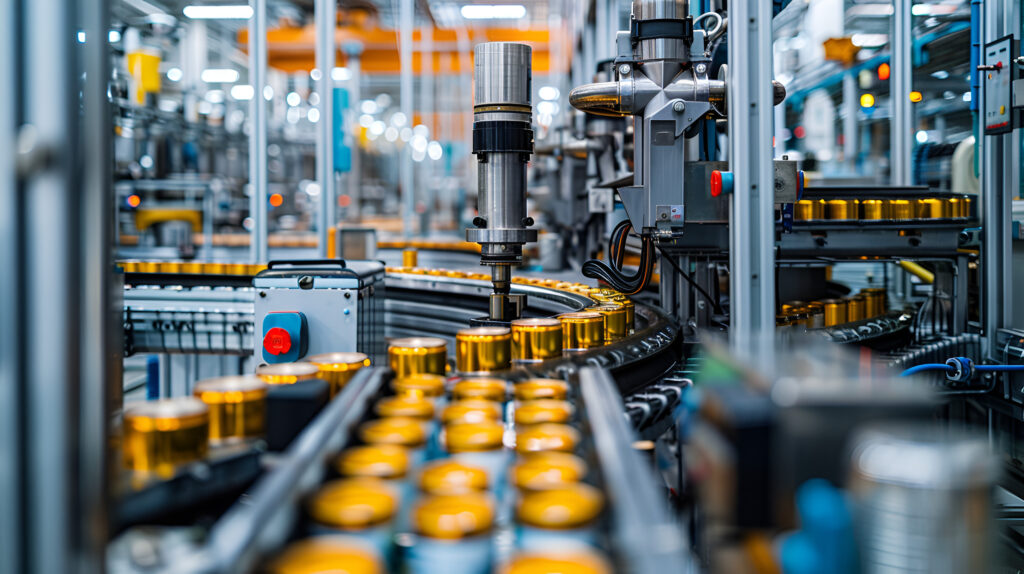The food and beverage (F&B) industry faces relentless pressure from rising costs, tight delivery schedules, strict regulatory requirements, and the need to maintain high levels of food safety. In this environment, unplanned downtime poses a significant threat to productivity and profitability. This insight paper outlines the challenges facing the F&B manufacturing industry, the impact of downtime, and the role of Condition Based Monitoring (CBM) in mitigating these issues and future-proofing critical production operations.
Challenges Facing the Food and Beverage Manufacturing Industry
- Strict regulatory compliance: The F&B sector is heavily regulated due to the nature of its products. Any deviation from strict controls can lead to contaminated products, outbreaks, illnesses, and lawsuits
- Global pandemic preparedness: The food and beverage industry is essential for global food security and must maintain production resilience
- Cost and efficiency pressures: Manufacturers must balance delivering quality products at the lowest cost while adhering to strict regulations
- Cross contamination risks: A leading cause of downtime, cross-contamination can lead to significant production halts and consumer health risks
- Complex shop floor assets: Wide ranging machinery types/ages and multiple OEMs with varying service requirement adds a unique maintenance challenge
- Complicated maintenance scheduling: Balancing needs of production with machinery availability for scheduled maintenance or availability of third-party engineers for breakdowns
- Machinery performance & food quality standards: Machinery breakdown can lead to missed fulfillment deadlines, materials spoilage, and reputational damage
- Asset health changes: Identifying changes in asset health and predicting failures are crucial for profit margins and operational continuity.
The Cost and Productivity Impacts of Downtime
Unscheduled equipment failures present a weekly threat to 62% of F&B manufacturers, with 42% citing it as the primary risk to production targets.
- Production Losses: The industry faces an average loss of 300 production hours yearly, with some businesses reporting losses of £50,000 per hour.
- Contamination Risks: A major concern in food safety, contamination incidents reported to the Rapid Alert System for Food and Feed (RASFF) are frequently due to foreign material in products.
- Wasted Resources: For perishable goods like dairy, downtime can cause thousands of pounds worth of lost product if not resolved quickly.
- Supply Chain Disruptions: Plants operate 16 to 20 hours per day, but downtime averaging 15 hours per week significantly impacts operational costs and delivery schedules.
- Revenue Losses: Equipment failures lead to lost revenue, missed deliveries, damaged customer relationships, and competitive disadvantages.
- Operational Costs: Unplanned downtime costs the industrial manufacturing sector $50 billion annually.
The Role of Condition Based Monitoring (CBM)
CBM is a proactive maintenance strategy that continuously monitors the asset’s condition in real-time predicting and helping to avoid failure. It leverages sensors and diagnostic tools to track key performance parameters like vibration, temperature, vacuum, current, flow, viscosity, air quality, etc.
Benefits of CBM:
- Cost Savings: Predictive maintenance, including CBM, can save 8-12% over preventive maintenance and up to 40% over reactive maintenance.
- Downtime Reduction: IIoT-based condition monitoring can reduce downtime by up to 70%.
- Improved ROI: A F&B manufacturer achieved a 220.5% ROI with annual savings of $625,000 against a $195,000 investment in the first year.
- Avoidance of Production Losses: A chemical manufacturer prevented $1.2 million in production losses using CBM.
- Extended Equipment Lifespan: Early issue detection prevents excessive wear and optimises machine longevity.
- Enhanced Food Safety: Monitoring bearings and metal detection systems prevents contamination risks.
- Optimised Resource Allocation: Data-driven insights help prioritise maintenance activities and workforce deployment.
- Operational Efficiency: CBM, integrated with workforce management platforms, boosts efficiency and reduces downtime.
Implementing CBM in F&B Manufacturing
To successfully deploy a CBM strategy, manufacturers should:
- Invest in real-time data: Connected workforce platforms provide visibility into production conditions, enhancing decision-making
- Foster collaboration: Digital tools improve coordination across teams, ensuring swift and effective responses to maintenance needs
- Adopt proactive maintenance: AI-powered predictive maintenance tools analyse real-time data to prevent failures before they occur
- Digitise processing & packaging assets: Using sensor technologies, manufacturers can monitor critical parameters such as:
- Temperature/Humidity
- Vibration
- Flow
- Pressure/Vacuum
- Energy Consumption
- Current
- Lubrication
- Viscosity
- Wear/Strain
- Thermal
- Vision/Optical
- Utilise Data Analytics & AI: Machine learning analyses trends and provides actionable intelligence, allowing teams to prioritise maintenance based on actual asset conditions rather than fixed schedules.
Condition Based Monitoring offers a future-proof solution for F&B manufacturers facing challenges from downtime, regulatory compliance, and operational inefficiencies.
By leveraging real-time data, predictive analytics, and AI-driven maintenance strategies, CBM enables manufacturers to reduce costs, improve efficiency, and enhance food safety. Investing in CBM is a strategic move for companies looking to remain competitive in a rapidly evolving industry landscape.
Ready to transform your Food and Beverage operations and maintenance strategy?
Implementing Unipart’s CBM system offers a strategic solution for preventing unforeseen operational interruptions, enhancing food safety through equipment condition monitoring to mitigate contamination risks, optimising maintenance schedules and costs, and prolonging asset lifecycles.
Connect with us to explore how this system can safeguard your production efficiency in the highly regulated Food and Beverage industry.
Author: Ehtesham Rana



